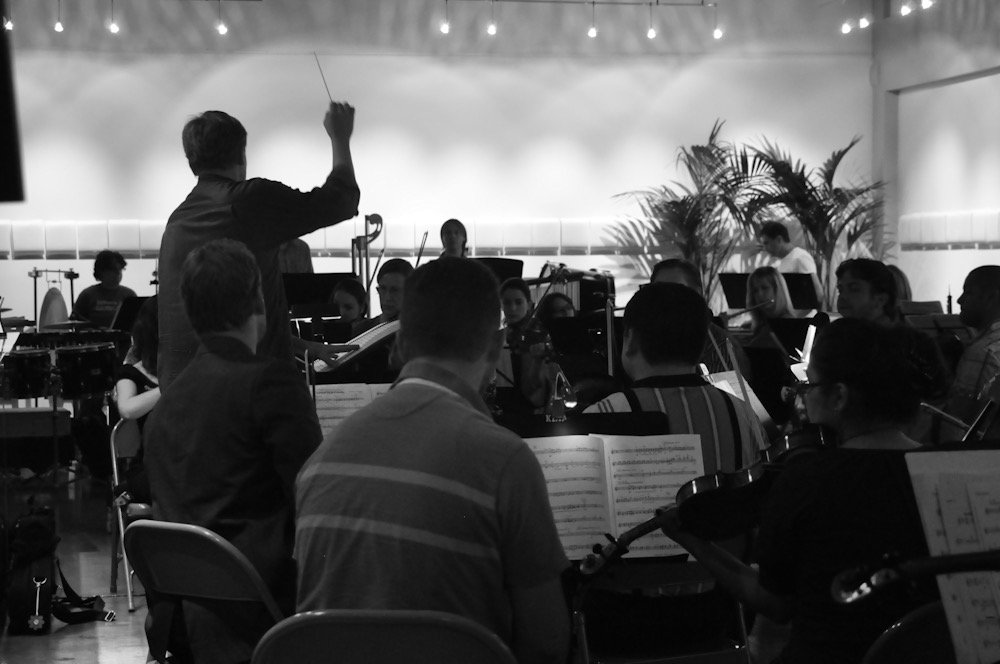
Composer Gustav Hoyer combines a rich classical background with modern sensibilities to create memorable musical experiences.
“Music can create an encompassing emotional induction that binds us to another person. We literally and figuratively resonate together when we share music. I want people to be reminded of the glorious and mysterious wonders of being alive and be filled in their soul with awe and joy.”
Whether composing for ensembles, media or multi-faceted musical encounters, Hoyer creates musical narratives that resonate with drama, richness and the contrast of light and dark moments. His recorded music has been heard in film, on radio and in performances worldwide. He founded and directed the Los Angeles-based Orchestra Unleashed, dazzling audiences with a series of multimedia orchestral performances that reimagined the typical classical concert. Concurrently, Hoyer produced the original soundtrack for critically acclaimed stage epic “Acts, the Three Man Show.” He served as the Artistic Director for NoCo Artists. His album “The Gilded Age,” included The Steampunk Serenade for a 40-piece string orchestra and “The Mental Cartographer” drew upon the power of a full symphony orchestra. He worked with Octave records to record an album of new chamber music for piano and strings in “Conversations”. In 2024, Navona records released two albums of large-scale orchestral music: “The Rime of the Ancient Mariner” recorded by the Budapest Film Orchestra and “Symphony no. 1” recorded by the Royal Scottish National Orchestra. He studied composition at the University of Arizona, Colorado State University-Pueblo, the Aspen Summer Music Festival, and the Hartt School of Music where he earned his M.A in musical composition
Creating new works in the classical tradition is highly detailed work and involves many complicated conventions and traditions. These works also entail enormous logistical and financial challenges to bring to life . It is an uncommon medium for an artist of our time, Exploring the richness of traditional orchestral instruments and techniques along with modern technological tools drives Hoyer each day to create, educate and nurture listeners.
“I want to be a counter-cultural voice advocating for the earnest and authentic in an age of digital cynicism, sarcasm, and commercialism, and at the end of it all I want my music to penetrate deeply into a listener and remind them of the transcendent reality of what it is to be human.”
Central to his creative work is a deeply held lifelong Christian faith. It is this faith that has inspired and sustained his compositional work. Along the way, as he wrestled with continuing to compose and produce new music, he discovered a deep anchor in a biblically-informed understanding of the value of Beauty. In 2025 he was invited to speak to a community of advanced students at Csehy Summer Music School. The video is the message he shared with them.
Gustav Hoyer at work

Are you a pianist?
In addition to orchestral works, Gustav has created and performed challenging and engaging works. Learn more
Orchestral instruments were created and perfected over centuries before the invention of musical recording and playback technology. They were designed to fill a room and wash an audience in beautiful sounds without any amplification or electronic reinforcement. Their music flows from the organic world of wood, sap, reed, hair- the flesh and blood of the natural world. In order to master these elemental parts, the humans who play this music must study for decades to master them. They must labor alone for countless thousands of hours to train their minds to create what an audience will hear. They must be able to make hundreds of small decisions and delicate motions with their whole body to draw out of these instruments the best possible sounds at precisely the right moment, down to the millisecond of precision. The composer must make thousands of decisions about what note should sound on which instrument for what length of time using which instrumental sound technique. He must provide detailed instructions in a specialized printed language: musical notation, and prepare and publish a copy of these instructions specific to each player. And all of these decisions must be filtered through centuries of musical knowledge, convention, and expectation to create a blueprint for what is ultimately a profoundly human encounter of soul on soul through sound. So, back to the question, why write new music in an 'old-fashioned' style? Because, for me, it is the only language that can describe the modern musical impressions I want to convey. To bring people into mindful and active listening requires music that is delightful enough to savor, but detailed enough to reward focus and effort. Each note, each stroke of the bow, each breath of the flute or oboe are layered together like a rich and intricate oil painting that rewards attention at a distance and up close.

